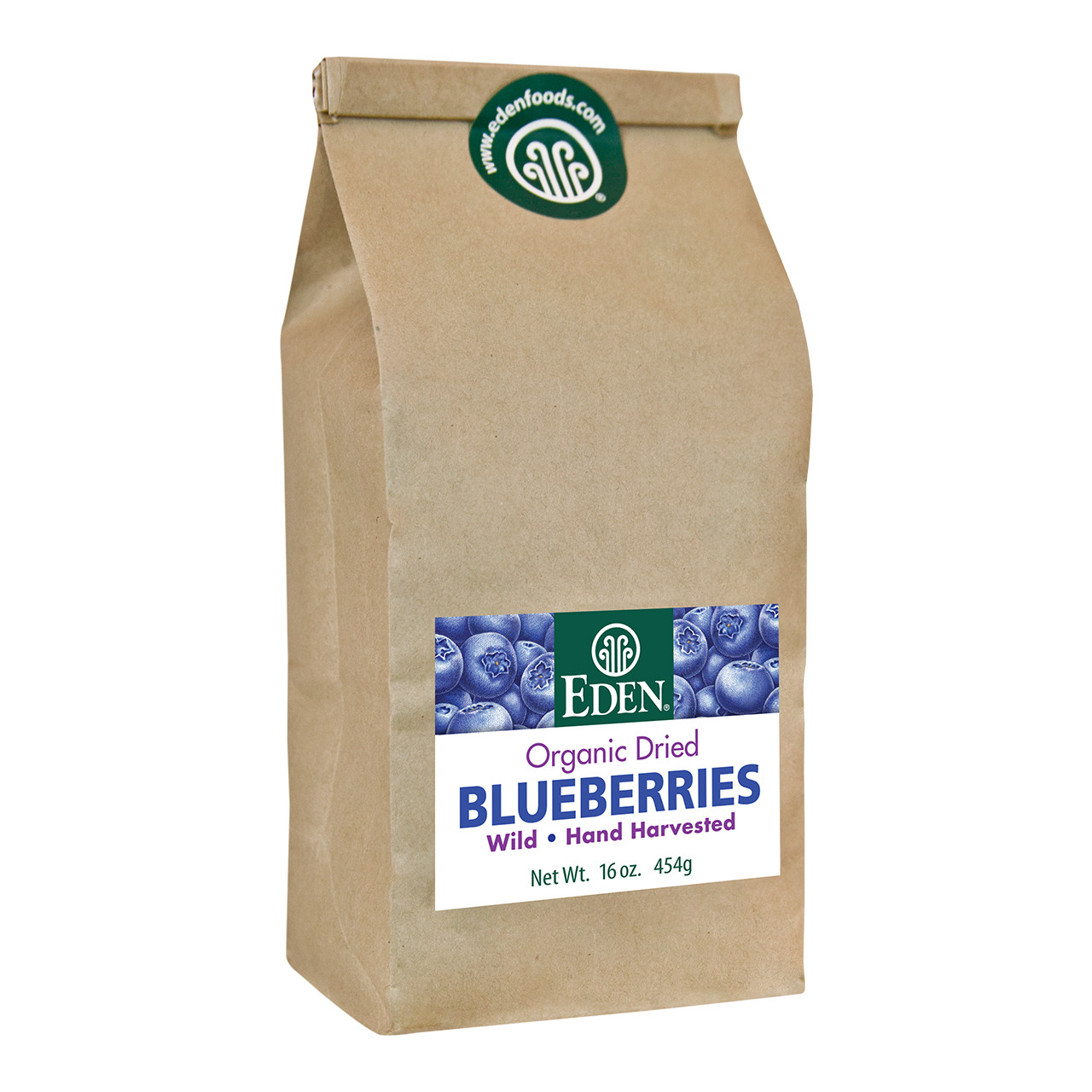Low-bush, organic wild blueberries, picked and infused with organic apple juice concentrate, slowly dried and misted with organic sunflower oil to prevent clumping. No refined sugar, sulfites, or other chemicals. Very low sodium, no salt added, a good source of fiber, and low fat. USDA rates 'wild' blueberries' #1 in antioxidant activity.
MORE DETAILS
Organic EDEN Wild Blueberries are from lowbush wild blueberry fields called 'barrens' in northern Québec that have been organically managed since 1996. Formerly heavily forested, just a few years after logging they became filled with native wild lowbush blueberries. Blueberries are picked in August, washed, cleaned, sorted, and quick frozen. Later they are thawed and infused with organic apple juice concentrate to a targeted sweetness or 'Brix'. Infused blueberries are rinsed, slowly dried, and misted with organic sunflower oil to prevent clumping. They require no refrigeration.
History
Wild blueberries have been gathered from fields and forests by Americans for at least centuries, used in stews, soups, cooked with corn, sweetened with maple syrup or honey, and worked into jerky. The blossom or calyx of each berry forms a five pointed star. Native Americans called it 'star berry', and elders told stories of the Great Spirit bringing star berries to comfort children. Blueberry juice was used to ease 'old coughs,' and to dye rugs, blankets, and clothing. They made smoked berries, sun-dried berries, and blueberry powder to add to their meats and other dishes. Leaves and roots where used to make tea. Native Americans taught Pilgrims how to grow, store, and use native plants. Wild berries were important food of early settlers.
Varieties
There are more than 450 plants in the blueberry family Vaccinium, but just a few are native to North America: the wild low-bush sweet blueberry Vaccinium angustifolium; two high-bush varieties now used to cultivate blueberries Vaccinium corymbosum and Vaccinium ashei; and the sour New England variety Vaccinium myrtilloides. The wild low-bush blueberry is native to northeastern North America growing from Minnesota to Maine, and from southern Canada to as far north as the Arctic. It grows in cooler regions producing small blueberries on a dwarf plant 1 to 2 feet high. Cultivated blueberries are a much taller bush grown in many areas and are planted like an orchard. Wild blueberry plants are not planted. They develop from native stands and their habitat is simply protected.
Nutrition Facts
Although both types of blueberries contain antioxidants, it is the wild, low-bush blueberry that is far higher in antioxidant activity. USDA uses a system called Oxygen Radical Absorbance Capacity (ORAC). By testing the ability of foods and other compounds to subdue oxygen free radicals, USDA determines antioxidant capability. The ORAC value of wild blueberries is 2,400. The highest of the 20 common fruits tested.
Unlike commercial dried fruit, organic EDEN Wild Blueberries contain no added refined sugar or high fructose corn syrup. They are free of sulfites, chemical preservatives, or any other additives.
Organic EDEN Wild Blueberries are a healthy snack food great for lunches, camping, and hiking, or just a real good snack anytime. There's no limiting them to a snack though. Use them in hot or cold cereals, cakes, scones and muffins, in pie fillings and puddings, and in grain and bread stuffing. Sprinkle them on salads. They're great in granola, muesli, granola bars, popcorn balls, and caramel corn.
















